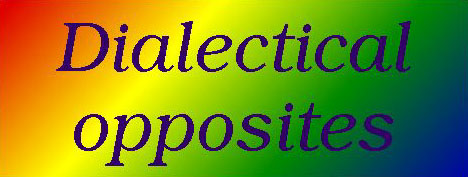
 Attract !
Attract !
Words that have contrasting meanings are called antonyms.
For example, Literal or literally has a meaning that is opposed to Figurative or figuratively:
The word Its opposite synonym antonym She literally examined the prescription. literal – actual, or obvious meaning; word for word, or verbatim. figurative – suggested, implied by the context, or not obvious, metaphorical, or imaginative. concrete abstract realistic impressionistic unimaginative creative text context Does not go beyond the strict meaning of a text. Often reveals a viewpoint or shared vision from the references adjacent to the text.
begin & end, advocate & abrogate, adapt versus exapt, pro & con, implicit & explicit, generate & degenerate, overt & covert, signal & noise,
accretion | analysis | artificial | bioceonose | city | duration | even | fitness | genotype | idea | organic | property | strict | zealot
A | B | C | D | E | F | G | I | L | M | N | O | P | Q | R | S | T | U | V | W | X | Y | Z
| The word -- Advocate (v) | Its opposite -- Abrogate (v) |
pro -- to propose, or speak in favor. |
against--
to relinquish support, or not favor |
| Accretion | Reliction |
| Land accumulated as the result of another area's erosion | Land lost to erosion of soil from water or wind. |
begin & end, advocate & abrogate, adapt versus exapt, pro & con, implicit & explicit, generate & degenerate, overt & covert, signal & noise,
| Adaptation | Exaptation |
a change, modification or altering in order to make viable, useful, or more widely understood. To revise, remodel, adjust or get used to a situation. A process of adjusting to fit a condition or coping with a novel, unforeseen situation; conversion, acclimation, habituation, acculturation, assimilation, accommodations, integration.
|
a complete change of function. Evolutionary biologists use the term exaptation to describe a commonplace occurrence in evolution: a limb or organ evolves originally for a particular function, but later on fulfills a very different function [*]. To fulfill an entirely unforeseeable role effectively. |
[*Gould, S. and Vrba, E. (1982) Exaptation - a missing term in the science of form.
Paleobiology 8: 4-15.]
A | B | C | D | E | F | G | I | L | M | N | O | P | Q | R | S | T | U | V | W | X | Y | Z
"Go with" or complementary words:
| Analysis | Synthesis |
to break into its constituent parts and explain. |
to bring together different parts and make sense. |
begin & end, advocate & abrogate, adapt versus exapt, pro & con, implicit & explicit, generate & degenerate, overt & covert, signal & noise,
A | B | C | D | E | F | G | I | L | M | N | O | P | Q | R | S | T | U | V | W | X | Y | Z |
| The word | Its opposite |
Begin --
to start, or commence. Birth |
End --
finish, terminate. Death |
begin & end, advocate & abrogate, adapt versus exapt, pro & con, implicit & explicit, generate & degenerate, overt & covert, signal & noise,
accretion | analysis | artificial | bioceonose | city | duration | even | fitness | genotype | idea | organic | property | strict | unknown | zealot
return to example
A | B | C | D | E | F | G | I | L | M | N | O | P | Q | R | S | T | U | V | W | X | Y | Z |
| The word | Its opposite |
pro -- to propose, or promote. |
Con -- to oppose, or disagree. |
begin & end, advocate & abrogate, adapt versus exapt, pro & con, implicit & explicit, generate & degenerate, overt & covert, signal & noise,
Accretion | adapt | analysis | artificial | bioceonose | city | duration | even | fitness | genotype | idea | organic | property | strict | unknown | zealot
begin & end, advocate & abrogate, adapt versus exapt, pro & con, implicit & explicit, generate & degenerate, overt & covert, signal & noise,
A | B | C | D | E | F | G | I | L | M | N | O | P | Q | R | S | T | U | V | W | X | Y | Z
| The word | Its opposite |
generate --
to prosper, or flower, initiate. |
degenerate --
to decline, or atrophy, decaying. |
| Genotype | Phenotype |
| In genetic biology the word used to describe the entire collection of DNA codes or the sequences of DNA or RNA on the chromosomes of living creatures or viruses. Meaning the inherent material for making proteins; implying the organisms potential range of traits and capacities. | This refers to the actual appearances of the genetic endowment of an individual creature, or the totality of the observable characteristics of individuals arising from environmental interaction with the genotype. Meaning the expression of the potential inheritance or endowment under real situations |
Crucially important words
| Idea, ideas, idealism. | Image, imagine, imagination. |
Something that one thinks or knows; a thought, concept, notion or mental awareness in the form of a vague impression or precise scheme, plan or model. From eidolon or eido, [Greek] éidos, appearance, form, idea. Referring to mental concepts that constitute the character of things.
They exist beyond explicit proof. To adhere to a set of beliefs because of their inherent verity or revealed reliability. |
An imitation or representation of a person or thing; the visual impression of a thing reflected in an opaque surface such as a water body or mirror. From imago, past participle of [Latin] imagnum: or the manifestation of mental powers to view from a fantastic perspective. A likeness or picture of a person or place or thing held in the mind as well as the eye, as opposed to the actual thing represented. A vivid or graphical description. To portray, delineate or represent in such a way as to capture the impression, symbolic representation or actual likeness of things through the use of evocative, vivid and descriptive techniques. Fanciful or unreal as in an imaginary friend. |
begin & end, advocate & abrogate, adapt versus exapt, pro & con, implicit & explicit, generate & degenerate, overt & covert, signal & noise,
A | B | C | D | E | F | G | I | L | M | N | O | P | Q | R | S | T | U | V | W | X | Y | Z
| Implicit | Explicit |
Inherent in the meaning,
tone, and context of the words and phrases in the surrounding paragraph. |
Clearly contained in the actual
expression of words based on the meaning of the words or phrases used. |
begin & end, advocate & abrogate, adapt versus exapt, pro & con, implicit & explicit, generate & degenerate, overt & covert, signal & noise,
begin & end, advocate & abrogate, adapt versus exapt, pro & con, implicit & explicit, generate & degenerate, overt & covert, signal & noise,
begin & end, advocate & abrogate, adapt versus exapt, pro & con, implicit & explicit, generate & degenerate, overt & covert, signal & noise,
begin & end, advocate & abrogate, adapt versus exapt, pro & con, implicit & explicit, generate & degenerate, overt & covert, signal & noise,
| "Nature" | "Nurture" |
| inheritance | environment |
Referring to a debate
in ethology, anthropology, biology and psychology about the relative importance
of inherited capacity to the success of an individual, family and species. |
The opposite side of the
debate in ethology that suggests that it is the circumstance of the upbringing,
the social milieu and hence the environment that has a major influence
in the success of a creature. |
| See discussion |
begin & end, advocate & abrogate, adapt versus exapt, pro & con, implicit & explicit, generate & degenerate, overt & covert, signal & noise,
begin & end, advocate & abrogate, adapt versus exapt, pro & con, implicit & explicit, generate & degenerate, overt & covert, signal & noise,
A | B | C | D | E | F | G | I | L | M | N | O | P | Q | R | S | T | U | V | W | X | Y | Z
| The word | Its opposite |
Overt--
in the open, observable, seen. |
Covert -- hidden, under handed, unseen. |
| Plaintiff | defendant |
one who files a complaint against another
party in civil or criminal court. |
One who is charged with a crime, tort,
violation, or some offense in a court of law. |
begin & end, advocate & abrogate, adapt versus exapt, pro & con, implicit & explicit, generate & degenerate, overt & covert, signal & noise,
| Preserve, Preservation | Conserve, Conservation |
The protection of any estate, property, artifact, or investment, from actions that would destroy the historical significance, functional integrity, commodity value, aesthetic amenity, or useful enjoyment of the entire range of parts contributing to the benefit of the whole. Protecting those people who depend on the resources for their livelihood and edification. The quality of that protection or sanctuary. |
The wise use of natural resources to promote the greatest good for the largest number of people over the longest amount of time. To keep from harm, decay, destruction, or dereliction through the long-term maintenance, investment, and care of the estate. The stewardship of those resources that belong to all citizens because of their essential character; water, energy, wildlife. |
begin & end, advocate & abrogate, adapt versus exapt, pro & con, implicit & explicit, generate & degenerate, overt & covert, signal & noise,
| Private property and resources: | Common property resource: |
Anything that has a deed of title showing exclusive ownership. |
anything, place or item used and needed by all. |
begin & end, advocate & abrogate, adapt versus exapt, pro & con, implicit & explicit, generate & degenerate, overt & covert, signal & noise,
A | B | C | D | E | F | G | I | L | M | N | O | P | Q | R | S | T | U | V | W | X | Y | Z |
| The word | Its opposite |
qualify --
to make the mark, a favorable performance, win a position to compete. |
disqualify -- to cut out, find in error,cull from a position or status, lose out. |
begin & end, advocate & abrogate, adapt versus exapt, pro & con, implicit & explicit, generate & degenerate, overt & covert, signal & noise,
begin & end, advocate & abrogate, adapt versus exapt, pro & con, implicit & explicit, generate & degenerate, overt & covert, signal & noise,
A | B | C | D | E | F | G | I | L | M | N | O | P | Q | R | S | T | U | V | W | X | Y | Z
| The word | Its opposite |
| Signal | Noise |
sign --
an identifiable pattern, or stream of information based on regularity
of grammar and syntax. |
distortion --
the random dispersal of disturbances that form no coherent or recognizable
pattern and hence interferes with the broadcast image, sound or photons. |
| Strict constructionist | Loose constructionist |
In areas of policy interpretation, based on a close reading of texts such as the constitution or laws, adherents to this approach read legislation very narrowly to circumscribe what any decree means. To rely very closely on the overt meaning of a text, phrase or meaning based on explicit authority of a document. |
In relation to legislative analysis and policy interpretation, those who base their understanding of a document on the context, implications and reasonable demands in the exercise of discretionary authority when acting under the authority of a legislative, administrative or constitutional text. Interpreting a document reasonably to apply to a broad range of implied powers. |
begin & end, advocate & abrogate, adapt versus exapt, pro & con, implicit & explicit, generate & degenerate, overt & covert, signal & noise,
| Tame | Wild |
domesticated, as in plants and animals,or other creatures that are selected by breeders for certain traits |
With respect to plants and animals, the original condition or in "feral" animals a return to the untamed state of their pre-domesticated ancestors. |
 |
|
A T-rex [ Tyrannosaurs Rex] skeleton named "Sue," at the Field Museum in Chicago. [JVS. 2003]. |
|
Tame means subject to artificial selection such as cows, horses, or corn. The term implies, docile or controlled, dependable. Bred for some economic or esthetic purpose by means of artificial selection. |
Wild suggests not bred for desired traits, as in the sense of plants and animals that are conditioned to natural selection as opposed to cultural influences that spread only by or through artificial selection. |
begin & end, advocate & abrogate, adapt versus exapt, pro & con, implicit & explicit, generate & degenerate, overt & covert, signal & noise,
| Variable, changing, mutable | Invariable, fixed, immutable |
| subject to changes that are either predictable or unpredictable. | Unchanging in that something is always what it is described to be. |
A | B | C | D | E | F | G | I | L | M | N | O | P | Q | R | S | T | U | V | W | X | Y | Z
| The word | Its opposite |
wax --
to grow or accumulate in size. |
wane -- to decline, lose mass, or lose favor |
| World view, worldview | Bias, prejudice |
| The beliefs a person or society have about the world in relation to the actual conditions of existence which may be contrary to those beliefs. (defined) | A set of unquestioned assumptions that are asserted as a dogma, or constant set of precepts. Unexamined assumptions people take for granted. |
begin & end, advocate & abrogate, adapt versus exapt, pro & con, implicit & explicit, generate & degenerate, overt & covert, signal & noise,
begin & end, advocate & abrogate, adapt versus exapt, pro & con, implicit & explicit, generate & degenerate, overt & covert, signal & noise,
Last Updated on: 08/20/2006, 2010
A | B | C | D | E | F | G | I | L | M | N | O | P | Q | R | S | T | U | V | W | X | Y | Z
begin & end, advocate & abrogate, pro & con, implicit & explicit, generate & degenerate, overt & covert, signal & noise, learning, types of.
Important antonyms:accretion | analysis | artificial | bioceonose | city | duration | even | fitness | genotype | idea | organic | property | strict | zealot
begin & end, advocate & abrogate, pro & con, implicit & explicit, generate & degenerate, overt & covert, signal & noise.
accretion | analysis | artificial | bioceonose | city | duration | even | fitness | genotype | idea | organic | property | strict | unknown
